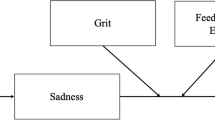Abstract
In this study we examine the role of general and task-specific affect on task and goal choice in a performance setting. We use video stimuli to induce a general positive or general negative affective state, and use rate-of-progress and absolute discrepancy feedback to manipulate task-specific affect. Analyses indicate that general affective states influenced task and goal choices, self-efficacy expectations, and performance. Rate-of-progress feedback influenced affective state, task choice, and self-efficacy expectations. Absolute discrepancy feedback influenced task choice modestly and self-efficacy significantly. Generally, positive affect promoted mood maintenance while negative affect promoted mood repair, and general and task-specific affect exerted similar effects. Results are discussed in terms of the motivational consequences of affective states (either general or task-specific) for task and goal choices.
Similar content being viewed by others
References
Bandura, A. (1982). Self-efficacy mechanism in human agency.American Psychologist, 37 122–147.
Bandura, A. (1986).Social foundations of thought and action: A social cognitive theory. Englewood Cliffs, NJ: Prentice-Hall.
Bandura, A., & Cervone, D. (1986). Differential engagement of self-reactive influences in cognitive motivation.Organizational Behavior and Human Decision Processes, 38 91–113.
Baron, R. A. (1988). Negative effects of destructive criticism: Impact on conflict, self-efficacy, and task performance.Journal of Applied Psychology, 73 199–207.
Baron, R. A. (1990). Countering the effects of destructive criticism: The relative efficacy of four interventions.Journal of Applied Psychology, 75 235–245.
Brief, A. P., Burke, M. J., George, J. M., Robinson, B. S., & Webster, J. (1988). Should negative affectivity remain an unmeasured variable in the study of job stress?Journal of Applied Psychology, 73 193–198.
Burke, M. J., Brief, A. P., George, J. M., Roberson, L., & Webster, J. (1989). Measuring affect at work: Confirmatory analyses of competing mood structures with conceptual linkage to cortical regulatory systems.Journal of Personality and Social Psychology, 57 1091–1102.
Burke, M. J., & Pearlman, K. (1988). Recruitment, selection, and matching people to jobs. In J. P. Campbell & R. J. Campbell (Eds.),Productivity in organizations (pp. 97–142). San Francisco: Jossey-Bass.
Carver, C. S., & Scheier, M. F. (1990). Origins and functions of positive and negative affect: A control-process view.Psychological Review, 97(1), 19–35.
Diener, E., & Iran-Nejad, Ashgar. (1986). The relationship in experience between various types of affect.Journal of Personality and Social Psychology, 50(5), 1031–1038.
Diener, E., & Larsen, R. J. (1984). The independence of positive and negative affect.Journal of Personality and Social Psychology, 47 1105–1117.
Diener, E., Larsen, R. J., Levine, S., & Emmons, R. A. (1985). Intensity and frequency: The underlying dimensions of positive and negative affect.Journal of Personality and Social Psychology, 48(5), 1253–1265.
Gotlib, I. H., & Meyer, J. P. (1986). Factor analysis of the Multiple Affect Adjective Check List: A separation of positive and negative affect.Journal of Personality and Social Psychology, 50(6), 1161–1165.
Isen, A. M. (1990). The influence of positive and negative affect on cognitive organization: Some implications for development. In N. Stein, B. Levanthal, & T. Trabasso (Eds.).Psychological and biological approaches to emotion (pp. 75–94). Hillsdale, NJ: Erlbaum.
Isen, A. M. (1987). Positive affect, cognitive processes, and social behavior. In L. Berkowitz (Ed.),Advances in experimental social psychology (Vol. 20, pp. 203–253). New York: Academic Press.
Isen, A. M. (1984). Toward understanding the role of affect in cognition. In R. S. Wyer & T. K. Srull (Eds.),Handbook of social cognition (Vol. 3, pp. 179–236). Hillsdale, NJ: Erlbaum.
Isen, A. M., & Baron, R. A. (1991). Positive affect as a factor in organizational behavior. In L. L. Cummings & B. M. Staw (Eds.),Research in organizational behavior. Greenwich, CT: JAI Press.
Isen, A. M., & Geva, N. (1987). The influence of positive affect on acceptable level of risk: The person with a large canoe has a large worry.Organizational Behavior and Human Decision Processes, 39 145–154.
Isen, A. M., Johnson, M. M. S. Mertz, E., & Robinson, G. F. (1985). The influence of positive affect on the unusualness of word associations.Journal of Personality and Social Psychology, 48(6), 1413–1426.
Isen, A. M., Nygren, T. E., & Ashby, F. G. (1988). The influence of positive affect on the subjective utility of gains and losses: It's not worth the risk.Journal of Personality and Social Psychology, 55 710–717.
Isen, A. M., Shalker, T., Clark, M., & Karp, L. (1978). Affect, accessibility of material in memory and behavior: A cognitive loop?Journal of Personality and Social Psychology, 36 1–12.
Isen, A.M., & Simmonds, S. F. (1978). The effect of feeling good on a helping task that is incompatible with good mood.Social Psychology (nowSocial Psychology Quarterly),41 345–349.
Locke, E. A., Cartledge, N., & Knerr, C. S. (1970). Studies of the relationship between satisfaction, goal-setting, and performance.Organizational Behavior and Human Performance (nowOrganizational Behavior and Human Decision Processes),5 135–158.
Locke, E. A., Lee, F. E., & Bobko, P. (1984). Effect of self-efficacy, goals, and task strategies on task performance.Journal of Applied Psychology, 69 241–251.
Marcic, D. (1989).Organizational behavior: Experiences and cases. St. Paul, MN: West Publishing.
McGuinness, D., & Pribram, K. (1980). The neuropsychology of attention: Emotional and motivational controls. In M. C. Wittrock (Ed.),The brain and psychology (pp. 95–139). New York: Academic Press.
Sarason, I. G., Potter, E. H., III, & Sarason, B. R. (1986). Recording and recall of personal events: Effects on cognitions and behavior.Journal of Personality and Social Psychology, 51(2), 347–356.
Tucker, D. M., & Williamson, P. A. (1984). Asymmetric neutral control systems in human self-regulation.Psychological Review, 91 185–215.
Watson, D., & Tellegen, A. (1985). Toward a consensual structure of mood.Psychological Bulletin, 98 219–235.
Weiner, B. (1982). The emotional consequences of causal ascriptions. In M. S. Clark & S. T. Fiske (Eds.),Affect and cognition: The 17th Annual Carnegie Symposium on Cognition (pp. 185–209). Hillsdale, NJ: Erlbaum.
Author information
Authors and Affiliations
Rights and permissions
About this article
Cite this article
Saavedra, R., Earley, P.C. Choice of task and goal under conditions of general and specific affective inducement. Motiv Emot 15, 45–65 (1991). https://doi.org/10.1007/BF00991475
Issue Date:
DOI: https://doi.org/10.1007/BF00991475




